The US Supreme Court has agreed to take up an appeal over whether Donald Trump is immune from criminal prosecution for acts committed in office, putting another potentially blockbuster case involving the former president on the high court’s docket ahead of the 2024 election.
The order on Wednesday will further delay a trial in a criminal case filed by the Department of Justice accusing Trump of seeking to overturn the results of the 2020 election. It will also give the high court — three of whose members were appointed by the former president — the chance to issue a landmark ruling on a question that could have major consequences for the upcoming election and for the presidency more broadly.
The Supreme Court set oral arguments in the matter for the week of April 22, with a decision expected in the case by the end of its term, which usually concludes in late June.
It had previously refused a request from Jack Smith, the DoJ special counsel overseeing federal criminal cases against Trump, to bypass the US Court of Appeals for the District of Columbia Circuit, an intermediate appeals court, and hear the presidential immunity matter immediately last year.
Earlier this month, that court handed down a unanimous ruling that barred Trump from using presidential immunity as a shield against the DoJ indictment.
Lawyers for Trump subsequently asked the Supreme Court to put the appeals court order on hold while he appealed against the decision. They argued that a “claim that presidents have absolute immunity from criminal prosecution for their official acts presents a novel, complex, and momentous question that warrants careful consideration on appeal”.
The Supreme Court on Wednesday said the appellate court’s order would remain on hold until it resolves the issue. The federal elections trial was originally set to begin on March 4 but has been postponed.
Had the court not taken the case, the lower appeals court’s ruling would have remained in place and proceedings in the trial court could have resumed imminently. It is unclear now whether Trump will face trial in the case before the election in November, when he is likely to face Joe Biden in a rematch of 2020.
Smith had warned the Supreme Court that a “delay in the resolution of [the election] charges threatens to frustrate the public interest in a speedy and fair verdict”.
Trump reacted to the decision with satisfaction, suggesting he sees it as a big legal victory. “Legal Scholars are extremely thankful for the Supreme Court’s Decision today to take up presidential immunity,” he said, adding: “Without presidential immunity, a president will not be able to properly function, or make decisions, in the best interest of the United States of America.”
Democrats were extremely critical both because of the delay that the decision would bring to Trump’s trial, and concern that some justices on the court, with a 6-3 conservative majority, may be sympathetic to the former president’s argument that he is immune from prosecution for his official actions while in office.
“The Supreme Court is placing itself on trial with this decision to hear the former president’s total immunity claim,” Nancy Pelosi, the California congresswoman and former House speaker, wrote on X. “It remains to be seen whether the justices will uphold the fundamental American value that no one is above the law — not even a former president.”
The high court has previously ruled on presidential immunity against civil claims, but it has yet to address the issue in relation to criminal charges.
Daniel Richman, a professor at Columbia Law School, said that even if the high court decides the case speedily, “a determination that the prosecution can proceed will leave the district court hard-pressed to schedule a trial before the general election”.
“Arguments that Trump and the people have a strong first amendment interest in presenting his views to the electorate are substantial, and may well counsel against requiring him to sit in the courtroom instead of campaigning,” he added.
The DoJ declined to comment.
Trump’s latest presidential campaign has been unfolding alongside a jam-packed legal calendar as he faces cases in courts across the country. Most recently he was slammed with a penalty of more than $450mn, including interest, in a civil lawsuit in New York over “blatant” fraud committed by his real estate empire. An appeals court judge in New York on Wednesday declined to pause enforcement of that judgment while Trump appeals.
He faces a total of 91 criminal charges across four separate cases. The DoJ and the state of Georgia have separately charged Trump with meddling in the 2020 election. Another federal indictment accused him of mishandling sensitive government documents.
The first case to reach trial will be one brought by Alvin Bragg, Manhattan district attorney, who alleged that Trump made “hush money” payments to porn actress Stormy Daniels in the lead-up to the 2016 election. Proceedings are set to start on March 25.
According to recent polling, Americans see the federal case related to the 2020 polls as the most serious for Trump, and a conviction in the case could lead to a drop in support for him in the general election.
The Supreme Court has also taken up another politically sensitive case involving Trump. It is poised to decide whether he can be barred from Colorado’s primary ballot in the presidential election, after a ruling from that state’s high court determined he was ineligible to hold office. It heard oral arguments in the case earlier this month.
An Illinois court on Wednesday joined Colorado and Maine in throwing Trump off the state’s presidential primary ballot on the basis that he engaged in insurrection. The evidence in the case is linked to the January 6 2021 attack when his supporters stormed the US Capitol in an attempt to halt the certification of Biden’s victory. The order remains on hold pending a potential appeal and the Supreme Court’s decision in the Colorado case.
Trump’s campaign called the Illinois ruling “unconstitutional” and vowed to “quickly” appeal against it.
Additional reporting by James Politi





































